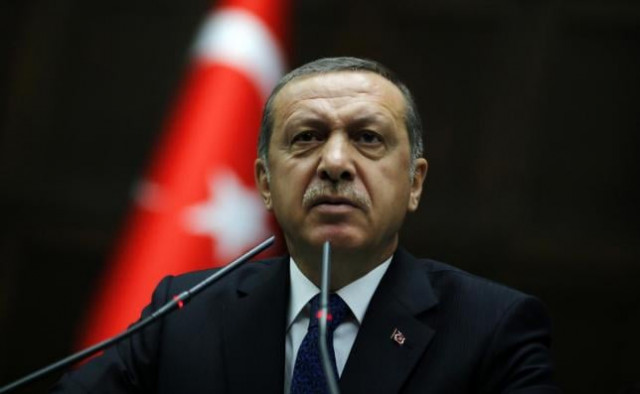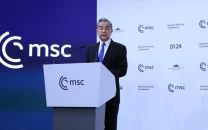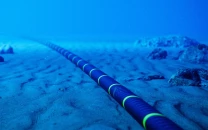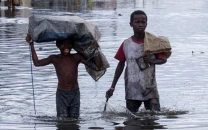EU chief meets Erdogan as asylum requests hit record 1.25 mn
The humanitarian crisis is particularly acute at the Idomeni crossing where around 12,000 people are stranded

PHOTO: REUTERS
The EU president - who has said the numbers arriving from Turkey are "far too high" - was to push Erdogan for more intensive help in handling the crisis, after bluntly warning economic migrants to stay away from Europe.
With Tusk wrapping up a whirlwind diplomatic tour which has taken him from Vienna to Athens via the Balkans states in a bid to calm tempers over the migrant influx, the EU unveiled a plan for saving the passport-free Schengen zone that has been put in jeopardy over the crisis.
The "roadmap" -- a draft of which has been seen by AFP -- includes quickly creating an EU coastguard system and strengthening Greece's external border, the main point of entry for refugees and migrants fleeing war, persecution and poverty in the Middle East and beyond.
Greece says up to 70,000 migrants may be ‘trapped’ next month
As the diplomatic efforts went into high gear ahead of a March 7 summit between the EU and Turkey, the human misery along the Greek-Macedonia border worsened after a night of driving rain and plummeting temperatures.
The humanitarian crisis is particularly acute at the Idomeni crossing where around 12,000 people are stranded after Austria and the Balkan states imposed a cap on entries, triggering a rapidly-growing buildup in Greece.
"It was very difficult, nobody slept, and this morning the children were crying," said Teshrina Sharif, a Syrian woman travelling alone with a three-year-old and a five-year-old.
By Friday morning, the encampment was transformed into a sea of mud after many hours of rain. And with temperature dropping, several surrounding peaks were covered with snow.
Macedonia briefly opened the border, letting another 320 through before resealing it, Greek police said.
"Many people who arrived last night slept outside because they don't have tents," said an aid worker from Doctors Without Borders (MSF), which put up some of the people in its field hospital for sick children.
Many families have been there for days, and even weeks, and on Friday, another 200 people could be seen walking towards the camp, carrying children and pushing buggies or wheelchairs. Others lugged duvets, tents and rucksacks stuffed to bursting point.
Antonis Rigas, head of the local MSF mission, said the number of toilets at the site needed to be eight times higher in order to service the growing need, raising fears of an epidemic of gastroenteritis.
Greece is the main entry point for the more than one million migrants who have reached Europe by sea from Turkey over the past 14 months, prompting increasingly frantic diplomatic efforts to curb the influx in the two states which are on the frontline of Europe's worst migration crisis since World War II.
Germany tries three migrants for thefts in New Year chaos
New figures released Friday by the Eurostat statistics agency showed a record 1.25 million asylum seekers arrived in the EU in 2015, more than double the figure the previous year.
Syrians were the largest group, numbering nearly 363,000, followed by 178,200 Afghans and 121,500 Iraqis.
Arriving in Ankara on Thursday, Tusk held talks with Prime Minister Ahmet Davutoglu where he pushed for a sharp cut in the numbers reaching the Greek islands.
"It is for Turkey to decide how best to achieve such a reduction," Tusk said, suggesting a "fast and large-scale mechanism" for returning migrants from Greece which he said would "effectively break the business model of smugglers".
Tusk has pulled no punches, bluntly warning economic migrants to stay away.
"Do not come to Europe," he said. "Do not believe the smugglers. Do not risk your lives and your money. It is all for nothing."
And he also lashed out over the border closures, describing them as "unilateral" moves "detrimental to the European spirit of solidarity".
With the UN warning the border closures could leave it with 70,000 people stranded on its soil this month, the EU has offered 700 million euros in emergency funding for Greece and other states.
The border closures have also pushed the 26-country Schengen zone to the brink of collapse, with the EU unveiling a plan for restoring the passport-free zone by November.
If Schengen collapsed, the cost spread over a decade could reach 1.4 trillion euros ($1.5 trillion), the plan says.


















COMMENTS
Comments are moderated and generally will be posted if they are on-topic and not abusive.
For more information, please see our Comments FAQ